In this month’s At the Helm, our Senior Vice President Tracy Marshall spoke with Jerrell Cox, CEO of United South End Settlements in Boston. Jerrell reflects on his path to becoming USES’s leader, which started when he was 10 years old, how USES focuses on fulfilling the potential of the entire family unit, and what’s on the horizon as the organization marks its 130th anniversary.
Tracy: You held multiple roles at USES, including Director of Camp Hale as well as Vice President of Development and External Relations, before becoming CEO in 2022. How have your path and experiences prepared you for this role?
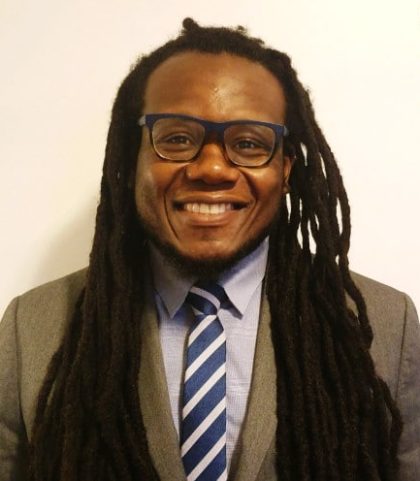 Jerrell: If I’m talking about the path that led me to becoming CEO, I have to start with my incredible parents for planting the seeds. My parents realized that the community surrounding us was crucial in setting fundamental values and helping me become who I am today. I was extremely fortunate that part of my community was USES and that my years as a camper at Camp Hale pushed me to learn and develop leadership skills, meet new role models, and build meaningful relationships. I truly believe that this experience shaped my understanding of what it means to be a good leader.
Jerrell: If I’m talking about the path that led me to becoming CEO, I have to start with my incredible parents for planting the seeds. My parents realized that the community surrounding us was crucial in setting fundamental values and helping me become who I am today. I was extremely fortunate that part of my community was USES and that my years as a camper at Camp Hale pushed me to learn and develop leadership skills, meet new role models, and build meaningful relationships. I truly believe that this experience shaped my understanding of what it means to be a good leader.
In 2009, I became the Director of Out of School Time Programs which included directing Camp Hale each summer. At that time, camp was facing many of the challenges that similar organizations face: HR issues, dated buildings, and on top of that, it’s a summer camp for mostly Black and Brown children located in a White community. So, I not only had to learn how to run all aspects of the business, but also how to develop and sustain community relationships. Five years into my role, Maicharia Weir-Lytle became the CEO of USES and made me the Director of Camp Hale. Together, we developed a vision for a capital campaign, and I had my first real introduction to fundraising and the power of philanthropy. We raised $5.6M in two years and completely transformed our camp; I was so proud of our team, donors, and community for giving our children the future they deserve. It was incredible to see people wanting to help, and making an impact through their time, giving and leadership.
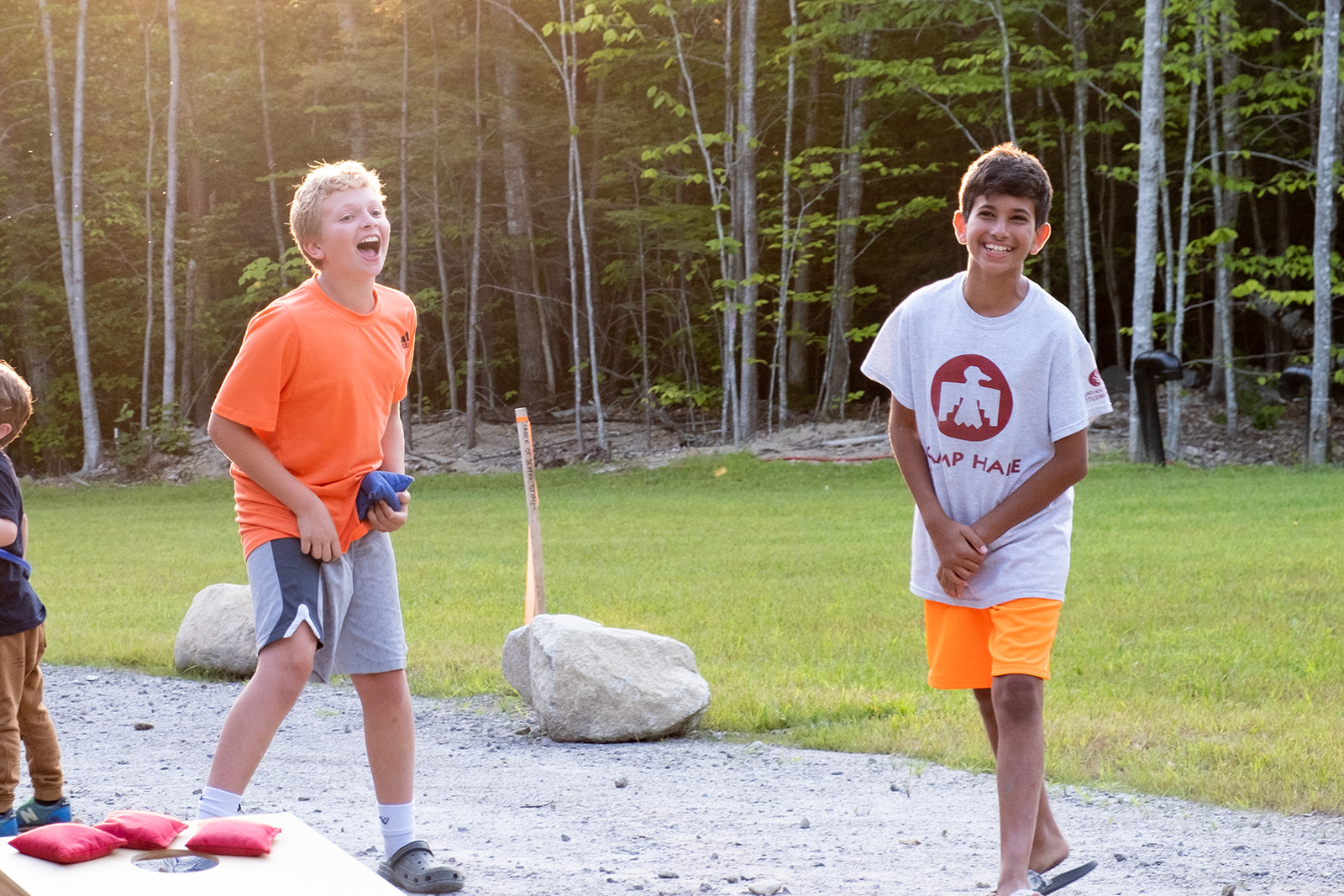 |
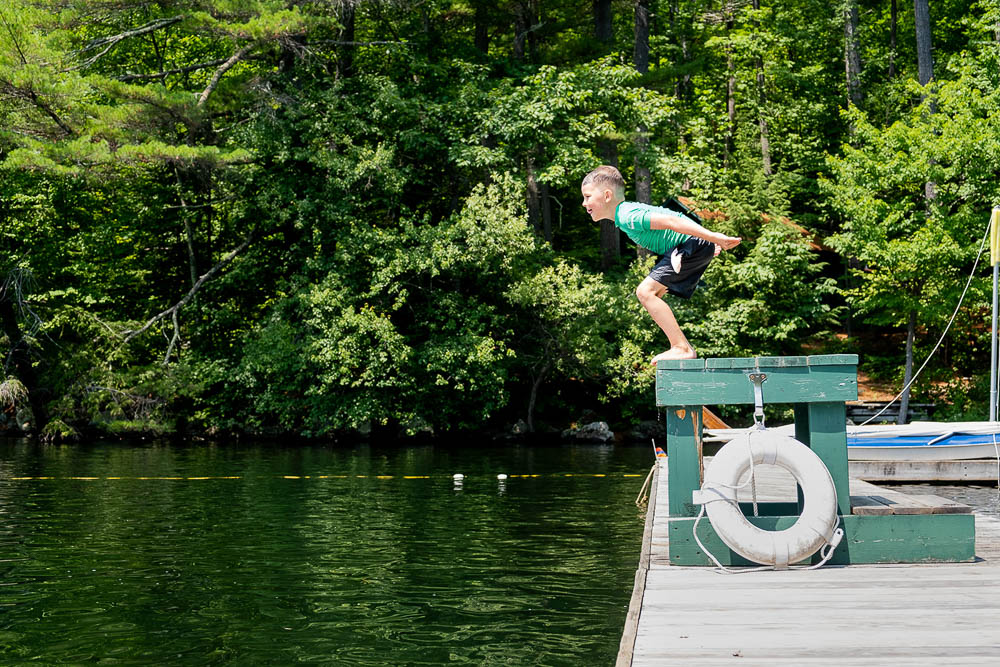 |
My experience and success at our camp propelled me into the role of Vice President of Development and External Relations in February 2020, right as the pandemic hit. As a result, I had to be flexible and creative in my decision making as we pivoted our service model to meet the needs of our community. In May of 2021 when Maicharia transitioned out of the organization, I became Co-Executive Director with José F. Massó. We were fortunate to already know USES, to understand its challenges, and to recognize some of the decisions and opportunities that were ahead. We partnered in this role for 10 months until José transitioned into a new role as the Chief of Human Services for the City of Boston. At this time, I had the honor of becoming the sole Chief Executive Officer of United South End Settlements.
USES harnesses the power of our diverse community to disrupt the cycle of poverty for children and their families. Can you share more about the programs you offer and their impact?
At USES, we offer our Core 4 programs, as we call it – all with the goal of supporting children and their families. We accomplish this through:
- Early Childhood Education – We believe starting early is important. We want to give our children the seeds and resources they need to have the best outcomes later in life.
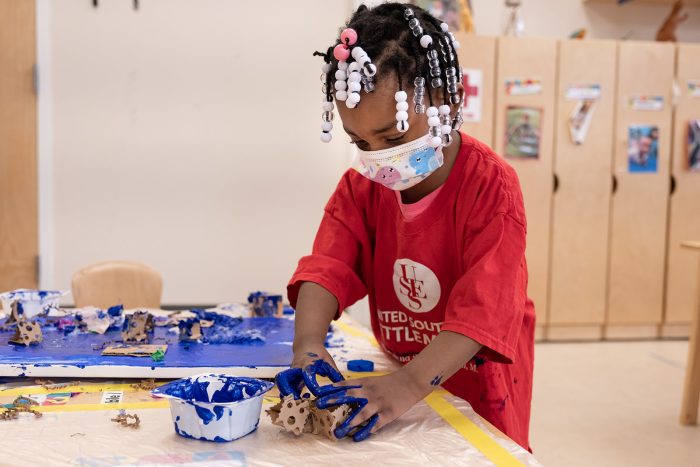 Afterschool Program – We support our children by providing mentors, offering homework assistance, and focusing on social and emotional learning. This is especially critical when we think about what was lost during the pandemic.
Afterschool Program – We support our children by providing mentors, offering homework assistance, and focusing on social and emotional learning. This is especially critical when we think about what was lost during the pandemic.- Camp Hale – Our residential summer camp that creates leaders through the wonders of Squam Lake. This program services mostly low-income kids—around 70% of campers—and provides them with an opportunity to get out of the city, connect with the natural world, unplug, and discover their own potential. It’s truly a powerful experience.
- Family Mobility – Ultimately, I think what’s special about our work is that in addition to supporting the children, we also support their parents through our Family Mobility program. This includes coaching and goal setting around careers, finances, family, education, and more, and connecting parents with resources and a network to hopefully help them make sustainable change. You stated our mission, but put differently, we know that it’s equally as important to support the children as it is to support their parents. If we support our children, but then they go home to poverty, disfunction, and stress, it will always be hard to produce positive outcomes. By working with the full family, we create a partnership – it’s not us telling them what to do, but instead giving them the training, resources, and support they need. This programming has evolved during the pandemic, too. One of the things we know about our Family Mobility program is that we have to be mobile ourselves. As our families face new issues, we have to adapt and change to address them.
USES was founded in 1892 in the South End of Boston, an area that at the time was largely populated by European and Asian immigrants and emancipated slaves. 130+ years later, how is the organization reaffirming its founding vision? How has the vision evolved?
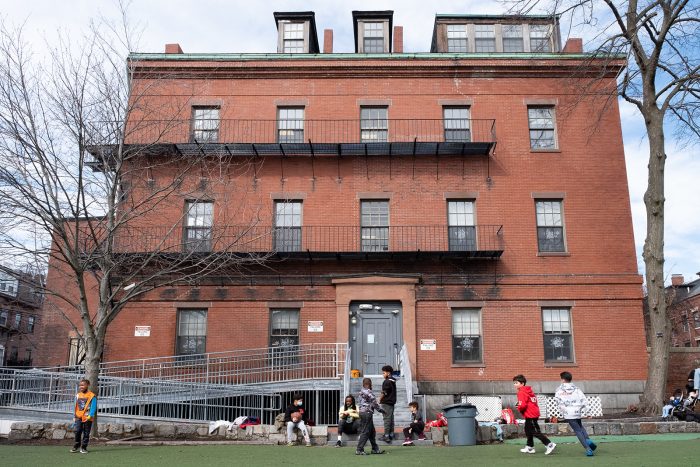 It’s interesting being here in the South End; it’s a different South End than the one my parents, aunts and uncles, and grandparents knew. But while the demographics and the landscape have shifted, I think our mission of providing a community—especially to those who have been displaced or disenfranchised—has remained the same. The Settlement House was founded with the goal of bringing the ‘haves’ and the ‘have-nots’—the wealthy and the disenfranchised—together to disrupt the cycle of inequity. Today, we continue to embody the vision of the Settlement House movement, recognizing that all people, no matter how challenged, or how privileged, can be the foundation for meaningful, sustainable change in our community.
It’s interesting being here in the South End; it’s a different South End than the one my parents, aunts and uncles, and grandparents knew. But while the demographics and the landscape have shifted, I think our mission of providing a community—especially to those who have been displaced or disenfranchised—has remained the same. The Settlement House was founded with the goal of bringing the ‘haves’ and the ‘have-nots’—the wealthy and the disenfranchised—together to disrupt the cycle of inequity. Today, we continue to embody the vision of the Settlement House movement, recognizing that all people, no matter how challenged, or how privileged, can be the foundation for meaningful, sustainable change in our community.
Since joining USES, what moments/accomplishments have meant the most to you?
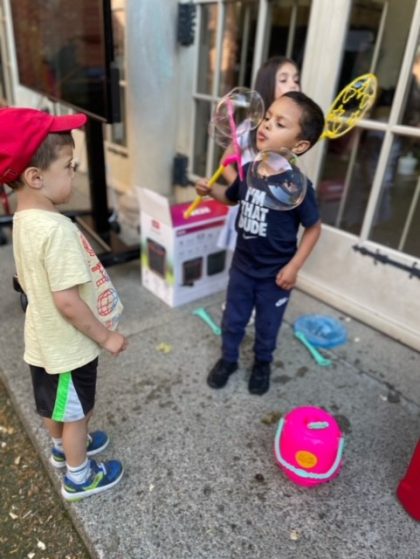
There are a lot! I’m proud that I can stand here, as a community member and former child of the organization and say that USES is the reason I am who I am today. All it takes is one person looking you in the eye and seeing your potential, even when you can’t see it yourself. So now that I get to be in this seat, I am so grateful to look at our kids, and tell them, “I know you can do it. I know you can do it, and I’ll be here every step of the way.” And to then watch them graduate college, select a career, have a family—knowing that I was a powerful presence in their lives, that I helped them feel like part of a community and see their own potential—that is one of my greatest accomplishments. USES works.
Of course, I have to mention Camp Hale again. Transforming that space ensures that Black and Brown youth like me will be able to experience this incredible program for generations to come. It’s such a magical and powerful place, and our Black and Brown kids deserve that.
I’m also really proud of how our organization adapted during COVID – I know it’s something that a lot of organizations did, but being a small organization meant we really had to tap each individual for support. So many of our initiatives and ideas come from our leadership sitting down at the table and saying, “We see these challenges in our communities. Let’s reach out to our families and see what we can do to help.” I think that right there is an accomplishment – to be able to say that we’re an organization that’s here for our people and their needs. That’s how our Food Distribution program started. During the pandemic, when we were all stressed at home, chasing down toilet paper, our organization somehow came together to create a volunteer-run food distribution program. People were showing up at USES in their cars, packing them with food, and delivering boxes all over, from Randolph to Roxbury, West Roxbury to the South End. It was a beautiful example of the power of community and of belonging.
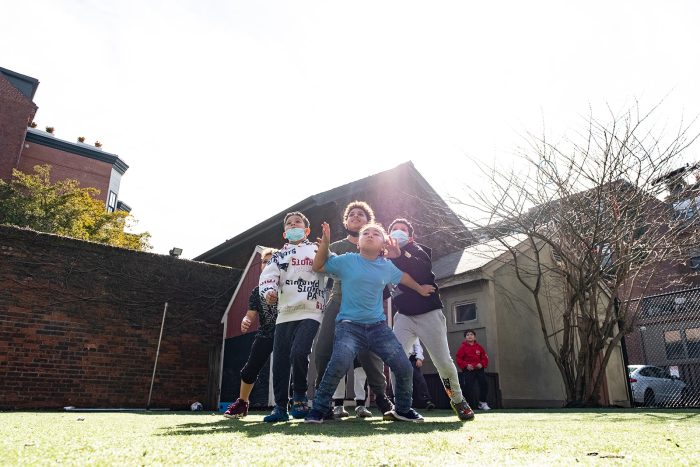
Another major accomplishment has been creating our guaranteed income program, Striving Towards Economic Prosperity (S.T.E.P.). Being able to give families money makes such a difference. It’s as simple as, “We know you need help and here is some money.” We then pair that with financial coaching, providing a safe place for them and their children to come, offering resources to help them make change and build their potential – and connecting them with other families who are facing the same challenges. It’s about individuals helping other individuals. We’ve been really fortunate to have donors who see the need for a program like this; they were so adamant that they didn’t want families to have to jump through hoops because they trusted the families and they trusted us to help them. To hear donors speak into our values and provide us with an opportunity to do really meaningful work has been a blessing.
Lastly, I have to mention our staff. They came back here during the pandemic, putting their own lives in jeopardy, so they could help our kids and the community. Witnessing their commitment was one of the greatest moments of my career. I’m inspired and honored to work alongside them.
What is on the horizon for USES?
So I officially became CEO in May, and it’s funny – when you first take over, everyone is asking you, “What’s your vision? What’s your vision? What’s your vision?” Meanwhile, I haven’t even looked inside all my desk drawers yet!
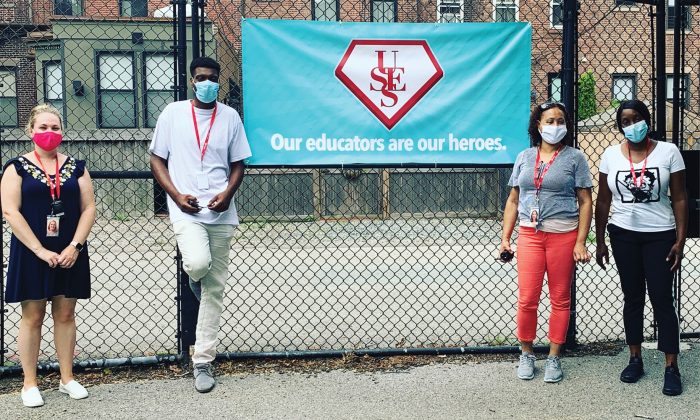
What I’ve really been focused on, though, is retaining staff during this challenging time. It’s critical to build a team of people who understand who you are and what you want to accomplish. Building trust is so important. On top of that, I have to prepare my staff to be adaptable. Strategic plans used to be five to seven years; now they’re two to three. You don’t know what’s on the horizon. So, one of my goals for USES is to change the cycle of being reactive and take a moment to pause and look around the corner.
I’m looking forward to reflecting on our strategic plan from the past year, Vision 125, and asking: What was missed in the pandemic? What can we build upon? What have we learned about ourselves? I want to take the time needed to be thoughtful as we plan ahead.
I’m also focused on continuing to develop relationships in our community that will uplift our brand and expand our network. I just hired a new Chief Development Officer (shout out to Development Guild!), who will help me do this. I hope to develop coalitions with other organizations who are doing similar work. Let’s speak louder and prouder and gain more support together. It’s together, not separate, where we can make a true difference.
What advice would you share with fellow leaders?
People are going to tell you, “It’s lonely at the top.” Well, it doesn’t have to be; I haven’t found it lonely at all. Build a community. Surround yourself with leaders who can help you understand problems, focus on solutions, and remain grounded in your mission. That’s what I would say to fellow leaders – we need to support each other. I’m here and open to supporting you, and I would love your support, too. We are attacking the same issues, which means we are united. So I’m here for you, and I hope you’re here for me.

